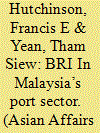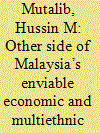|
|
|
Sort Order |
|
|
|
Items / Page
|
|
|
|
|
|
|
| Srl | Item |
| 1 |
ID:
180313


|
|
|
|
|
| Summary/Abstract |
The Belt and Road Initiative (BRI) has been characterised as a large-scale initiative to boost the movement of goods and services, capital, and people from China to Southeast Asia and beyond. Transport and logistics are a key aspect of this enterprise, with many projects focussing on railways, road networks, and ports receiving priority attention. However, BRI-related initiatives are often cast in unitary terms, with agency and autonomy almost uniquely ascribed to China-based firms and funders, and very little attributed to host country agents or their interests. Since 2013, Malaysia has received substantial inflows of BRI-related funds for infrastructure, particularly railways and ports. The Kuantan Port Expansion on Peninsular Malaysia's East Coast and the Melaka Gateway on its West Coast are two port-centred development projects associated with the BRI. Begun at the same time, these initiatives are similarly structured, as joint ventures linking large China-based state-owned enterprises with local players. Despite their similarities, these two projects have followed vastly different trajectories. While the Kuantan Port Expansion is proceeding according to schedule, the Melaka Gateway lies mired in delays and controversy. Through comparing and contrasting these two projects, this article will explore how – despite China's financial and political influence – host country actors can and do oppose, subvert, and even veto infrastructure initiatives perceived as inimical to their interests.
|
|
|
|
|
|
|
|
|
|
|
|
|
|
|
|
| 2 |
ID:
151472


|
|
|
|
|
| Summary/Abstract |
Many governments, in their zeal to progress and deliver the fruits of development, are caught in a web of unsavory habits and practices that impair not only their international image but also domestic legitimacy. One such perennially persistent and resilient disease is ‘money politics.’ Taking Malaysia as a case study, we note that despite sustaining a remarkable record of economic and multiethnic stability, the country has also been helpless in mitigating this obstinate issue. In this article, it is posited that the phenomenon is not a new or recent portent but has actually persisted even prior to independence. We shall then contend that unless the ruling Barisan Nasional (BN) coalition government attaches greater priority in stamping out this political bug, the country’s otherwise enviable development trajectory and the quest to reach a ‘developed nation’ status via its Vision 2020 declaration, even if fulfilled, are not cause for celebration, given its implications to the country’s economic sustainability and multiethnic stability.
|
|
|
|
|
|
|
|
|
|
|
|
|
|
|
|
|
|
|
|
|